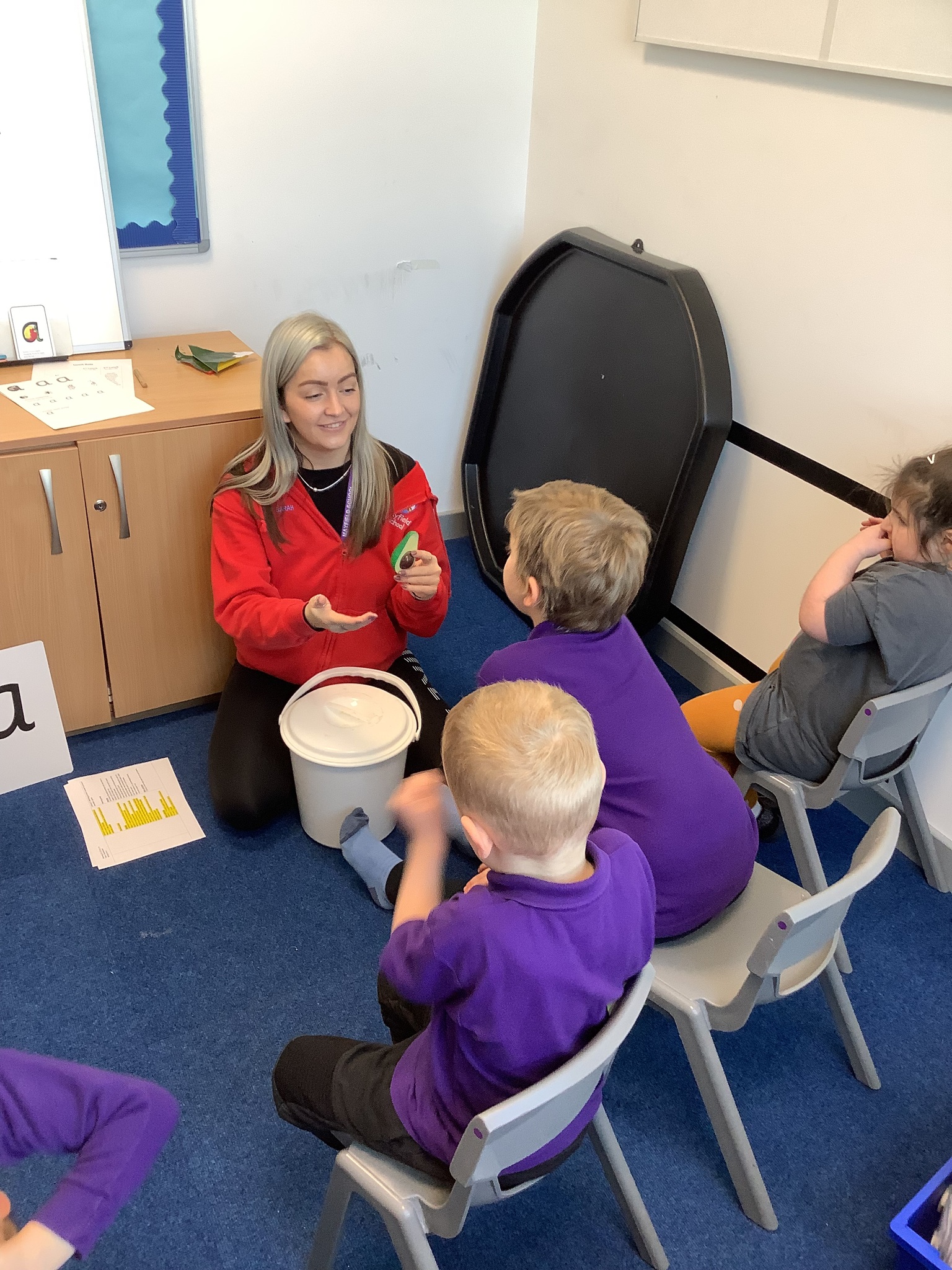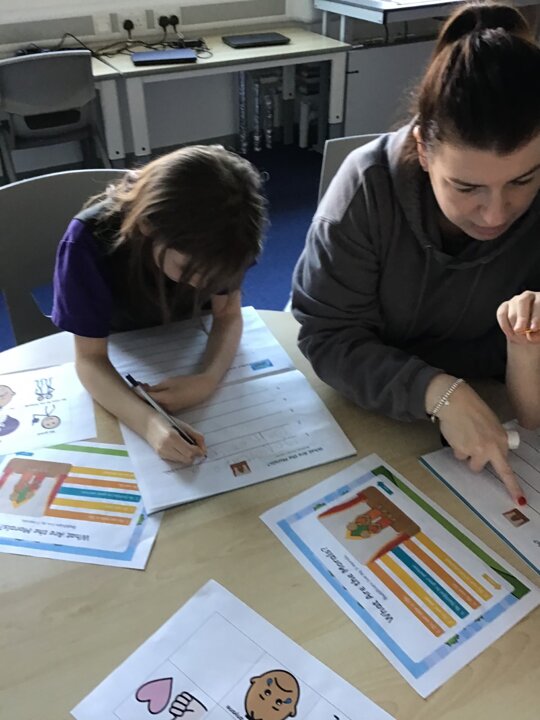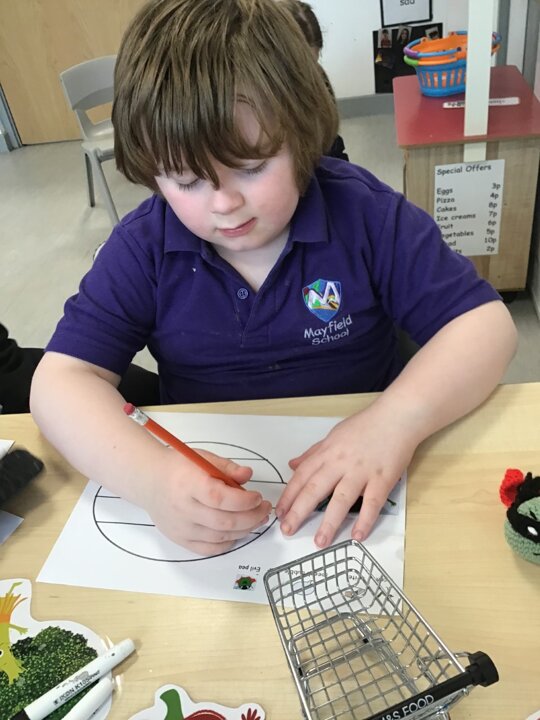Mayfield School believes that our English and Literacy curriculum should develop our pupil’s love and desire to be effective readers, writers and overall effective communicators. Being an effective communicator gives us choices, control in our lives and is key to developing literacy. We want our pupils to have the ability to gain and provide information in their lives, which will help them to gain independence. Our ultimate goal is that all our pupils become functional readers and writers with an increasing vocabulary. We do however recognise that our pupils are all on a different types of journeys and as such provide a curriculum, which helps them to reach their own individual goals.
Our pre-formal pupils are in the early developmental stages of communicating. They need the opportunity to learn from their immediate environment and gain skills such as responsiveness, making choices and memory. This pathway offers pupils a multi-sensory approach to their learning that may include, but are not limited to, sensory storytelling, objects of reference, call and response activities, Tac Pac and Intensive Interaction. It aims to move pupils from being passive learners to active through the development of exploration, realisation, anticipation, persistence and initiation skills.
The semi-formal curriculum really puts communication and emergent literacy at the heart of learning. Based on the Equals unit “My Communication”, our semi-formal English curriculum, has three key principles known as the 3Ms - Motivation, Means and Mate delivered across ten areas of communicative learning. Our lessons are designed so that pupils are motivated to communicate, have the appropriate means to communicate and have someone to communicate to, a mate. This makes it process based, with the understanding that pupils will learn the process of communication by communicating, and the more opportunities they have of communicating, the more secure their learning will be. Alongside the cornerstone of communication, we also deliver pre-reading and pre-writing skills within the Semi-formal curriculum. This includes the development of the fine and gross motor skills required to use mark-making tools, which we do in partnership with Occupational Therapists and Physiotherapists and encourage pupils to explore pre-writing activities. Pre-reading activities include sharing books with adults and becoming familiar with stories, songs and rhymes, recognising familiar signs and symbols and developing and awareness of letters and sounds.
Mayfield’s formal curriculum looks to develop fluency and comprehension in reading and writing and to offer a more academic, formalised learning framework. Pupils working within this curriculum have access to reading schemes and corresponding comprehension activities, which are rotated as the pupils mature to reflect more age appropriate subject matters, whilst maintaining reading at the correct academic level – Read Write Inc books, Project X and Dockside. They follow the Read Write Inc Phonics Scheme and the Penpals writing scheme. Pupils have access to a range of reading materials including fiction, non-fiction, poetry and plays and we hope to foster a love of independent reading.
A high proportion of our pupils exhibit some difficulties in language and communication and a deficit in vocabulary. Our Total Communication Approach, means that our pupils have access to a range of non-verbal means of communication and an integral part of their education is learning how to use these means to access the curriculum and further their ability to be an active learner. This includes low technology solutions such as the use of symbols, PECs and visual aids to more high technology communication systems such as Eye Gaze technology or communication apps such as Proloquo2Go
being used across the school. Makaton signing is used across the school enabling pupils to have a common language to communicate with staff and their peers regardless of their verbal abilities.
Whichever, literacy or communication pathway our pupils take, we hope that all our pupils, when they leave Mayfield, will be ready to be active communicators and literate in their world. We want all pupils to have a means of letting people, familiar and unfamiliar, know what they want and how they want to achieve this. We want pupils to have a desire and the means to gain information and to provide information to others, in order to have control and choice over their lives.
Phonics and Reading
Reading is a fundamental life skill and as such we place a huge amount of importance on the development of good phonological knowledge and the acquisition of early reading skills.

Phonics
We use the Read Write Inc Phonics programme. All staff teaching the programme have had the relevant training to do so. We aim for children to learn to read at a pace suitable for them. We want children to love reading and to want to read for themselves.
In the Pre Formal classes, emphasis is placed on the importance of sound discrimination through developing listening, sounds, rhythm and rhyme. When students are ready they move through the RWI programme at their pace. Through the programme children learn the 40+ phonemes which include the alternative pronunciation of sounds. The children become skilled at blending for reading and segmenting to aid spelling as well as learning to read and spell common exception words. The programme is carefully structured with each part of the phonics lesson having a specific purpose. The phonics sessions are fast paced and consistent to promote participation and engagement. Children use different methods to learn to decode such as ‘Fred Talk’ and ‘Fred in your Head’. This develops into speeding reading, promoting fluent word reading skills and good foundations in spelling. Some students at Mayfield School recognise words by sight which is encouraged and, for some, this becomes their preferred and effective reading choice.
Reading Packs
In the Pre Formal classes each child has a pack with a book of their choice with sensory props to bring the story to life, adapting for each individual.
Whilst on the RWI programme children have reading packs that contain letter flash cards (practising their phonemes) and a book that reflects their phonic knowledge from the scheme. Until the child is able to blend they will share a book of their choice with an adult, commenting on the book. These packs go home and parents are encouraged to report back on how their child reads at home. Teachers are responsible for recording and assessing the individual reading of each student.
Reading
The students experience print in a variety of forms and for a variety of purposes and read for enjoyment, information and interest. Students participate in shared reading and individual reading. Through these methods, students are encouraged to decode text in a variety of ways, such as phonic decoding, recognising letter patterns and reading for meaning. Students are shown how to derive meaning from text in group and individual sessions and they are encouraged to share personal preferences and opinions about books. Students are taught to appreciate the tools of the individual authors, illustrators and publishers and read for and with other student and adults in a variety of situations.
Sensory Stories
Sensory stories convey simple narratives using a mixture of text and complimentary sensory experiences. Each section of the story (normally just a short sentence or two in length) is accompanied by a sensory experience to help bring the story to life. For example, in a story where a boat is crossing the sea, water spray may be sprayed. When telling sensory stories, it is good to incorporate all the senses where appropriate to touch, smell, sounds, taste and visual stimuli. Sensory stories are appropriate for all learners in school and enables them to access stories in many different ways rather than just auditory involvement. This is also supported by story massage strokes, activities are then planned to enhance the story.
Wider Reading
Students have regular access to a well-resourced library within the school. They are encouraged to select, borrow and return books, reflecting a real life scenario. This is an opportunity for students to be independent and make personal choices of books that they are interested in. Students are encouraged to take these books home to share. Students are also invited to reading events, such as book fairs and celebrating World Book Day.

What Is Read, Write Inc?
Read Write Inc is a whole school approach to teaching reading and writing. It is a systematic, synthetic phonics programme developed by Ruth Miskin. The sessions are delivered by enthusiastic trained members of our staff team. All staff in school are trained by Ruth Miskin Training to ensure consistency.
Children are grouped in classes according to their reading progress. They participate in lively sessions throughout the week. Each session involves learning how to read and spell words, reading a decodable book, followed by a writing activity linked to the book they have read.
Assessments take place frequently to monitor progress for children to progress through the programme at their pace. Our aim is for children to learn to read.
Our aim at Mayfield school is to give every child the opportunity to become a writer and be excited about writing, in order to do this we follow a mixture of Pen Pals and Read Write Inc. when teaching writing.
We ensure to build strong foundations by placing an emphasis on fine and gross motor skills throughout the school in fun and engaging ways. Pupils make marks in a variety of ways and are encouraged to give meaning to the marks they make.
Pupils are taught letter formation rhymes and how to segment to spell during their Read Write Inc. phonics lessons which is then encouraged throughout the curriculum. When ready to do so children will be taught handwriting formally following our scheme.




.JPG)





